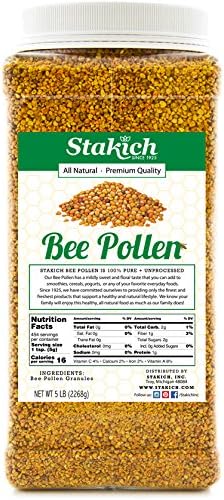What is the Buzz about Bee Pollen?

What is It and Where Does it Come From?
Bee Pollen has been called one of nature’s most perfect foods. Bee Pollen contains the male gametes of plants found as small dust pellets in the stamen of flowers. The male germ cell of plants is the most nutritious part. When the bee lands it get covered in the pollen. The pollen is brushed off the bees legs with a special device that is placed at the entrance of the hive by the bee keeper.

What is the Nutritional Value?
Bee pollen is packed full of antioxidants, vitamins, minerals and hormones in combination with digestive enzymes from the bees. Scientists agree that enzymes are absolutely essential for every biochemical function of the body.
Bee pollen is made up of 35% protein, 55% carbohydrates, 2% fatty acids and 3% minerals and vitamins. You will find a variety of vitamins and minerals in bee pollen including the following:
Vitamins: provitamin A, B1 (thiamine), B2 (riboflavin), B3 (niacin), B4 (group), B12 (cyanocobalamin), vitamin C, vitamin D, vitamin E, vitamin K, pantothenic acid, biotin, folic acid, choline, and inositol
Minerals: calcium, phosphorus, potassium, sulphur, sodium, chlorine, magnesium, iron, manganese, copper, iodine, zinc, and boron
Bee Pollen is also known to build the immune system and provide energy for the entire body. Sounds good right?
Why Should You Take it and Feed it to Horses?
Bee pollen provides energy, stamina and strength as well as improving mental and physical reactions. Horse owners are recognizing its value because of its ability to help both their body and a horse’s body recover from exercise, to return breathing and heart rate to normal, and to improve endurance.
Another reason to add it to your diet and feed Bee pollen to your horse is its ability to correct body chemistry and eliminate unhealthy conditions. Chemical pollutants can be a severe stressor to an immune system. Bee pollen is an excellent source of anti-oxidants. Research studies and clinical tests have demonstrated that Bee pollen can counteract the effects of chemical toxins and is thought to have the ability to throw off poisons and toxic materials from yours and your horse’s body.
Allergy sufferers usually have respiratory issues and/or skin reactions. Bee pollen reduces the production of histamine which can strengthen the respiratory system. It also will provide protein that can help the body build a natural defense shield against allergic responses.

Image: Ride Magazine
And finally, Lecithin is a nutrient in bee pollen that aids in the digestive process through increasing the speed that calories are burned and by helping to stabilize metabolism. Bee pollen has lecithin in it and therefore might help with weight maintenance in both humans and some horses.
How do you Take Bee Pollen and Feed Bee Pollen to Horses?
Bee Pollen comes in different forms for horses, some are powdered and some granular. For humans you can add capsules to your options.

Here are a few links bee pollen products that I like- click on picture for link:


Peace and Good Rides,

Laura, The Horse Hippie




Leave a comment